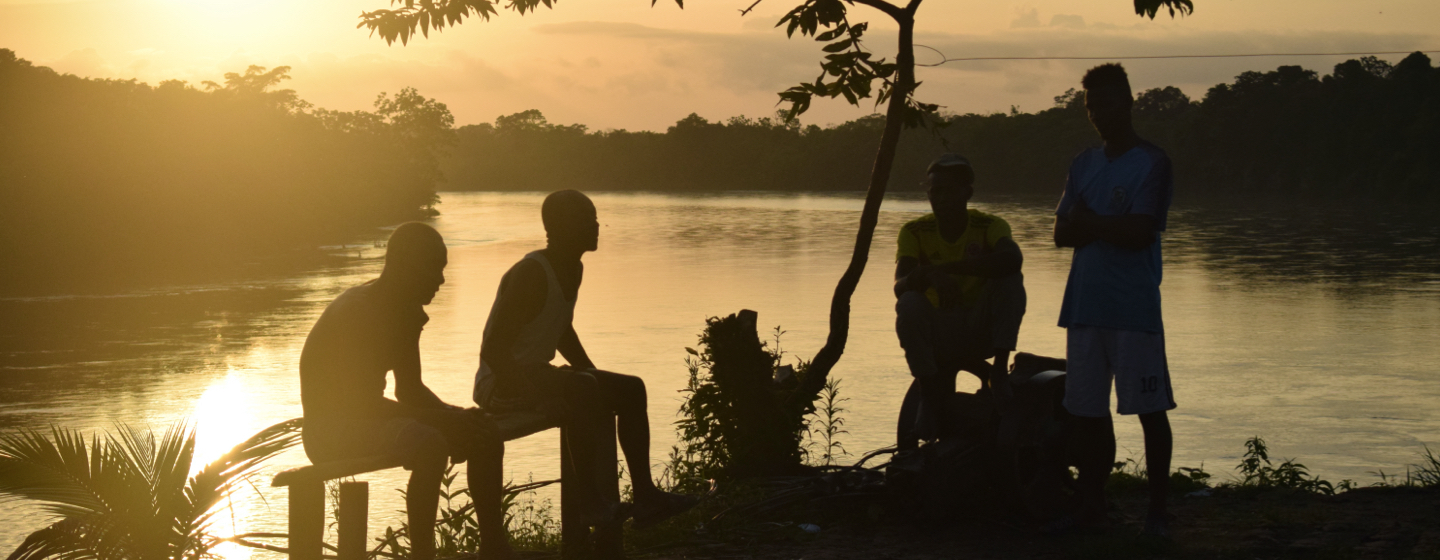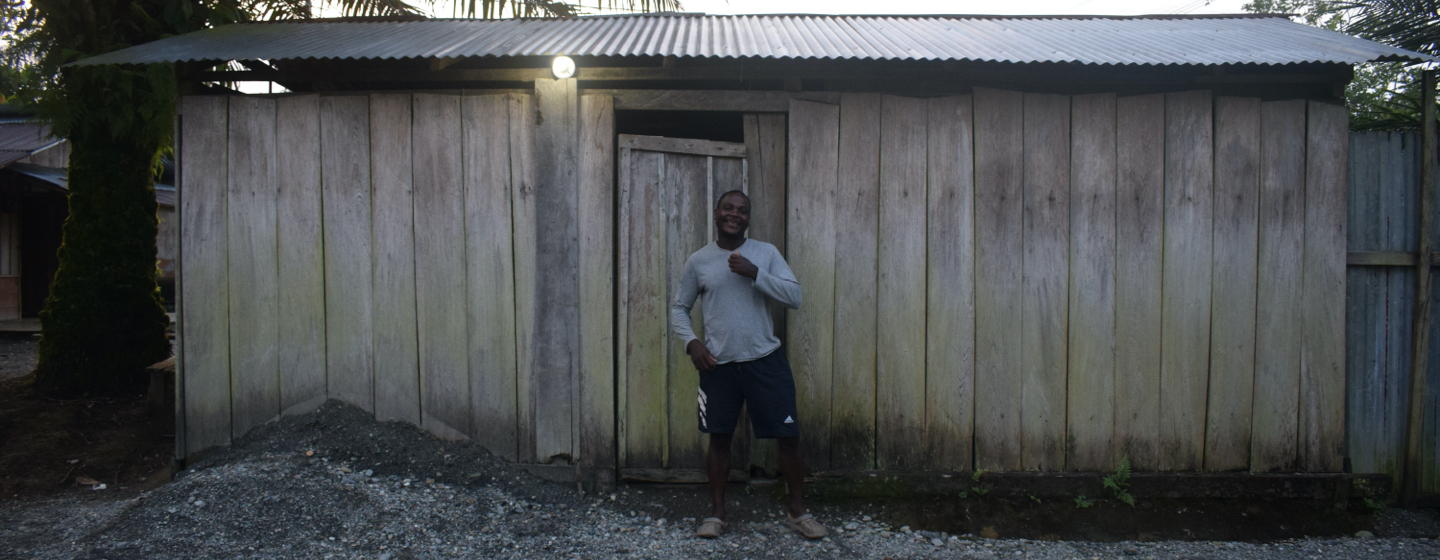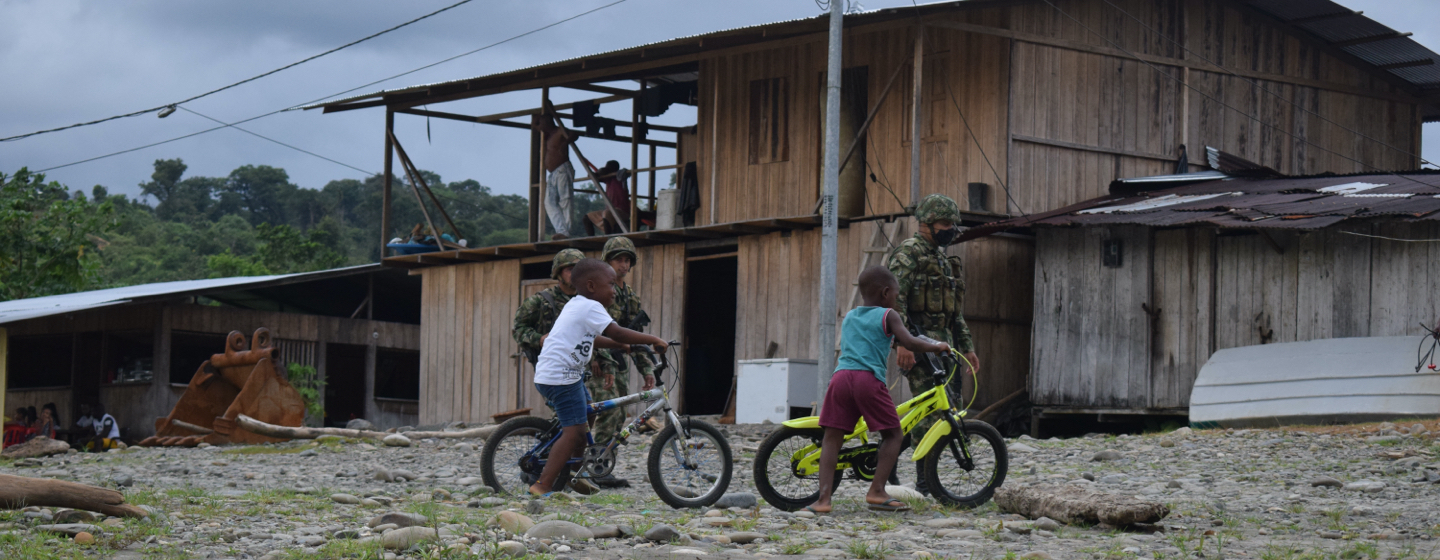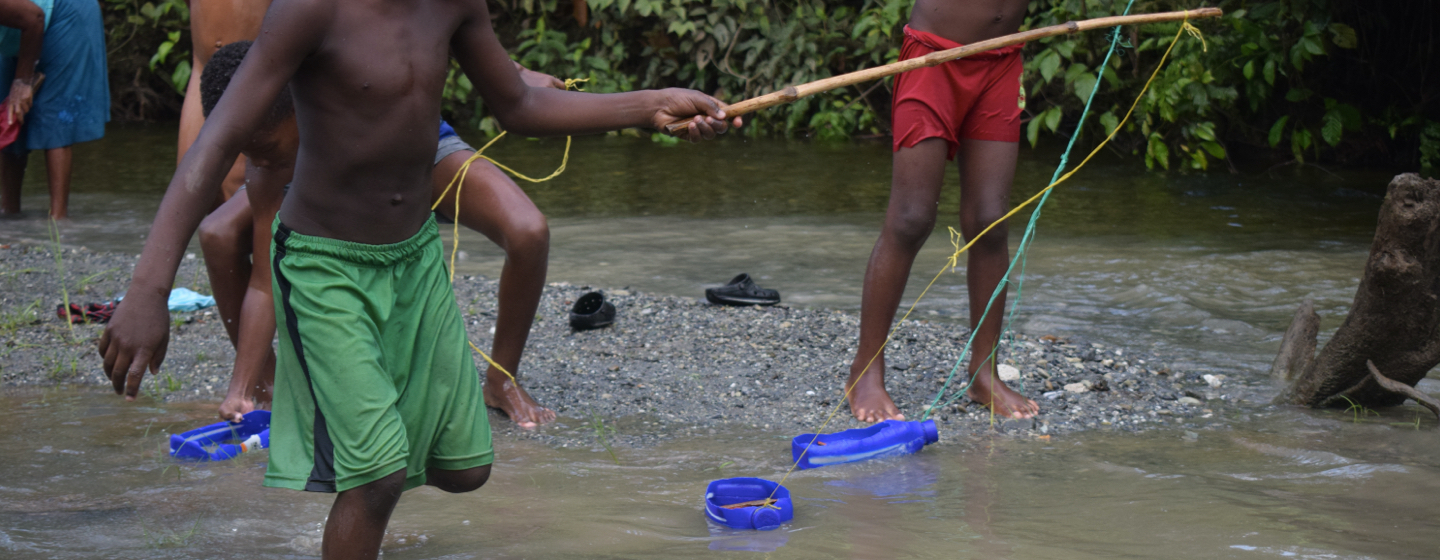It is in the hands of the different State entities that the black communities of the General Community Council of San Juan (ACADESAN) are not materially dispossessed. The legal team that today is fighting for the black communities draws attention to the scarce actions of the agrarian authorities and those responsible for the guarantee of victims' rights to protect ethnic-territorial rights.
Dawn breaks in the San Juan region and communities go about their day with the river. Others against the river, but some moment of their day is defined by being in or around the river. Elizabeth Moreno Barco, better known as 'Chava', representative of the General Community Council of San Juan (ACADESAN), wonders, with her back to the San Juan River, what is the interest of the Eightfold society and the businessmen she met —and those she still does not know— about the ancestral lands of Sipí.
“As an organizational process —she says with a voice that picks up speed with each breath—, at this moment I, as the legal representative of ACADESAN, am not in a position to cede a millimetre of land to any company or to any entity that comes to claim it without having those rights and without respect for autonomy and territorial authority. Today there is me, tomorrow there will be others, but the ancestral struggle will always be the same: the defence of the territory, the permanence of its inhabitants".
Every time ACADESAN's board members told the businessmen representing the now Eightfold that the title with which they were claiming rights to the 32,450 hectares of Choco jungle could not be of good provenance and that these were their ancestral lands, they were ignored.
For this reason, ACADESAN has tried to take its struggle to the courts, because not even the current Secretary of Government, and then mayor in charge of Sipí, Yeferson Palacios, was aware of the territorial dispute that is present in 25 percent of the municipality, until a socialization held on March 13th, 2021, when members of the ACADESAN council informed the local administration about this dispute.
The lawyer supporting the council in the process, María Fernanda Angulo, has documented each of the legal irregularities revolving around the title and also questions the good faith of the companies and businessmen who took ownership of the 32,450 hectares. With these inputs, the legal team initiated in January of this year actions to have the questioned title of the businessmen revoked, reiterating that the issue has been denounced since May 2019. However, it points out that the management of some state entities to prevent the dispossession is questionable.
Angulo explains that in May 2019, a judge specialized in land restitution asked the National Land Agency (ANT) for the file that grants ownership of the 32,450 hectares in the municipality of Sipí to the company Eightfold, but this entity never delivered it.
It was only after a ruling on May 3rd, issued by the Third Civil Court of the Buenaventura Circuit in response to a tutelage filed by ACADESAN, that the ANT handed over the file. Or what it has of it, because the folder is incomplete: it does not contain the map of the property, nor the request for adjudication, and much less other documents typical of an adjudication.
Until May of this year, ACADESAN tried to advance, hand in hand with the Ethnic Affairs Directorate of the Land Restitution Unit (URT), additional protective measures for the legal dispossession and threat of material dispossession, because although those directly involved are not illegal armed actors or companies and businessmen with known links to the armed conflict, the fact that a third party takes advantage of the vulnerable condition of the community in a context of conflict for which there are judicial protection measures is sufficient.
With the interlocutory order 040 of 2018, a judicial decision given in response to a request made by the Ethnic Affairs Directorate of the Land Restitution Unit, the First Civil Court of the Specialized Circuit in Land Restitution of Quibdó ordered precautionary measures of individual and collective protection, and territorial protection as a result of the affectations that the black and indigenous communities of the San Juan region were suffering that year.
ACADESAN's legal team was requesting action from the URT to jointly extend the precautionary measures of the interlocutory order 040 of 2018. "The mere existence of the property is a dispossession of the community —illustrated Angulo, referring to what is known as legal dispossession— and what we are alleging is that the situation of armed conflict present in the area which has been constant over a long period of time, puts the community in a situation of vulnerability that prevents them from even having knowledge of what is happening, and yet here’s a third party that takes advantage of these situations, pretending to have a right recognized over what is property of the community".
Thus, they sought out that the Specialized Judge in Land Restitution orders the prohibition of any use and exploitation by natural and legal persons outside the black communities of ACADESAN in the area of the individual title in question.
In addition, the Judge requested the Public Registry Offices to register the restitution request in the real estate registration folio of the land currently owned by Eightfold Biodiversity Bank and to order the materialization of a technical roundtable coordinated by the ANT so that “the illicitness of the title and the resolution is conceptualized; the non-existence of the private property title and non-applicability to the rights of the black communities, the initiation of the process of direct revocation of the registration in the ORIP and cancellation of the property record”, reads the document submitted by the legal team to the URT.
“Only with the cancellation of the real estate registration folio and the property record of property 184-9929, will the acts of legal dispossession by third parties cease, who in a situation of vulnerability of the community, take abusive advantage and in bad faith seek to profit from a land rightly owned by the community”, señala Angulo.
However, the conversations with the URT did not produce the results that the community council expected, so on May 24th, ACADESAN individually presented the request for the extension of precautionary measures before the Specialized Judge in Land Restitution of Quibdó. The community council took this decision because the state entity delayed the agreement of the document that they would jointly present to this judicial operator.
ACADESAN had made it clear to the URT officials that if they could not reach an agreement, they would present the request for protection on their own. “Given that the internal procedures and other efforts of the Unit —the URT wrote last May 21st via mail to ACADESAN— did not coincide with the times for delivery on the scheduled date, we would like to announce that the document is still under internal revisions according to the route and institutional guidelines, so that the Community Council can make decisions on the matter”.
The Court responded on June 25 and among the decisions taken, it granted the request to extend the precautionary measure of Auto 040 of 2018; to suspend notarial, judicial and administrative proceedings on the 32,450 hectares; and ordered the Ministry of Environment and the Environmental Corporation for the Sustainable Development of Chocó (Codechoco) to refrain from “granting environmental licenses on the property identified with the registration number 184-9929”.
The concern of the legal team advising the Community Council in this process is that the decision does not contain an express prohibition on the use and exploitation of the land by the foreign businessmen who own the land.
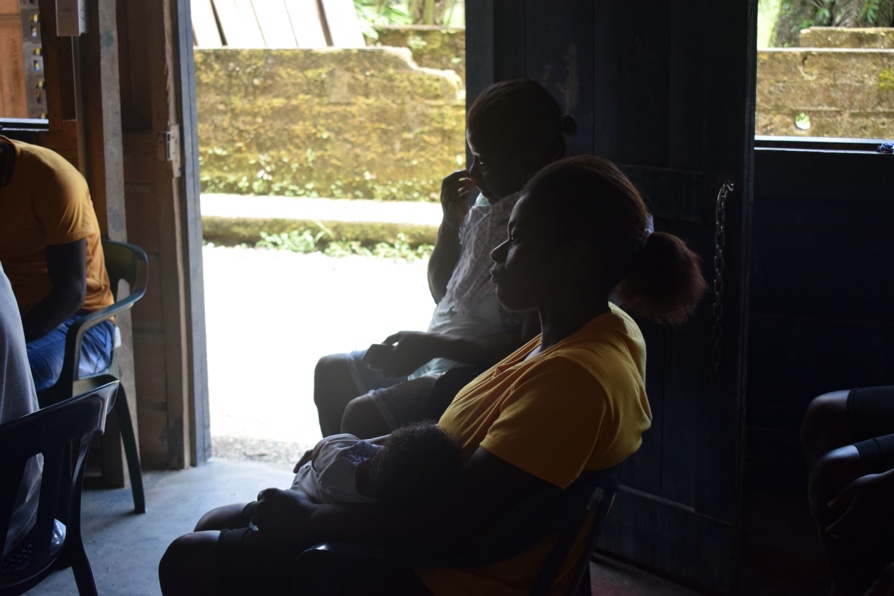
Slow management of the URT
VerdadAbierta.com sent several questions to the URT requesting information on the specific measures it has taken in this case. After a first decontextualized and general response about its management in the department of Chocó, on the last day of May it responded, in a few words, that it is still studying the case.
With resolution RZE 090 of 2021, this institution formally initiated the administrative process of attention and management of requests for protection and restitution of ethnic territorial rights in “cases of identified dispossession and abandonment of territories of black communities in the context of the internal armed conflict or its linked and underlying factors”. Due to the size of the property, the URT specified that it divided the field visits, which were necessary to determine the situation, into two.
Between April 15th and 29th, 2021, it made the first visit. “The second visit is scheduled for September 2021, in which the approach will be made to investigate whether a dispossession is taking place on the 32,450 hectares, located in the municipality of Sipí”, detailed the URT and added that it plans to file the claim for the restitution of territorial rights in the first four months of 2022.
They also indicated that a technical round table is being held with the National Land Agency, in which “they are analysing the documents available to the Restitution Unit in order to establish and determine the reason for the 1990 adjudication; it is planned that the following technical round tables will be attended by the Community Council inorder to deepen the analysis and thus determine the most appropriate legal route”.
Up until the end of this investigation, ACADESAN's legal team had no knowledge of the existence of this technical roundtable or the way in which the issue of the dispossession of their ancestral lands is being addressed.
In short, and this is what worries the black communities of Sipí the most, the network of businessmen and companies that today legally own the 32,450 hectares that threaten ACADESAN's collective title, can sell it whenever they want or take possession at any time.
The URT explained that it has been difficult to determine that this large piece of the Chocó jungle is under private ownership because the file of the origin of all this discord has not been found: the adjudication resolution that allegedly favoured Elvar Córdoba Delgado, dated February 10th, 1990.
And yet some of the answers that the URT needs in order to take action on the dispossession of the black communities of Sipí could be provided by the National Land Agency (ANT).

ANT and its long documentary search
At the time the 32,450 hectares were awarded, Law 135 of 1961 on agrarian social reform was in force, which was intended to eliminate and prevent the inequitable concentration of rural property or its uneconomic division and to provide land “to those who do not own it”. And in accordance with this norm, the title exceeds the size limit of the allotment.
Why does ANT recognize the legality of a title that exceeded 70 times the legal maximum allowed for individual titling at the date of award? The Agency responded to VerdadAbierta.com that as long as the resolution that benefited Elvar Córdoba Delgado, the original grantee, has not been annulled by the Contentious Administrative Jurisdiction, it is an act that is presumed to be legal.
And it acknowledged that certain documents are missing within the file, so that “he will proceed to repeat the search in the file archive and, failing that, a reconstruction procedure will have to take place”.
In order to initiate an administrative proceeding for the revocation of the adjudication of vacant properties that invalidates the title of Eightfold Biodiversity Bank SAS over the 32,450 hectares, without the need for the express and written consent of the titleholder, it is necessary to find the administrative file that gave rise to the issuance of Resolution No. 01326 of February 10th, 1990
The agrarian authority explained that it is common that, due to multiple causes, a file for the adjudication of vacant land can be lost. For this reason, the ANT has adopted a procedure for the reconstruction of files, based on the provisions of Agreement 007 of October 15, 2014 of the General Archive of the Nation and Article 126 of the General Code of Process
One of the steps in the administrative procedure for the reconstruction of files is the filing by the Legal Office of the ANT of a criminal complaint for the possible commission of the crime of destruction, suppression or concealment of public documents or such other crimes as the judicial office may consider in the investigation.
Although the revocation process is conditioned to the file, perhaps the most important aspect of the agrarian authority's response is that, when asked by VerdadAbierta.com, it recognizes that the adjudication, at least in terms of extension, is irregular.
“According to what is evidenced in the copy of Resolution No. 01326 of February 10th, 1990, and in accordance with the regulations in force at the time of the adjudication, it is not possible to adjudicate that extension of land, since Law 135 of 1961 established in Article 29 that the adjudication of fallows could be made for extensions of no more than four hundred and fifty (450) hectares per natural person”, stated the ANT.
Resisting in the middle of the jungle
ACADESAN's legal team and the black communities expected more from the state institutions. “In the case of the Ombudsman's Office and the Attorney General's Office, their actions are given in terms of answering the linkage of the office or what in the framework of their competences they evidence once the document has been filed”, reflects Angulo.
“In the case of the URT —he adds— its different internal spaces of discussion or approval for the subscription of said document is, in our opinion, extremely complex and highly dependent on visions of multiple dependencies, which is not commensurate with the urgency, threat and risk to which the black community and its territory are exposed to”.
As for the current title holders, Angulo highlights the responsibility of Eightfold Biodiversity Bank SAS, current owner of the land under discussion, and of the outsiders who are related to the business and who insist on taking advantage of this ownership. For this lawyer, the businessmen should have made a rigorous study of titles, as well as the real situation of the questioned property, to decide, under the principle of good faith, to buy the alleged right to this jungle property.
Regardless of the fact that the businessmen appeal to the argument of violation of the principle of legitimate trust of the State (arguing that the title was recognized in the state registries), the argument before the restitution process is another: that the lands of the ACADESAN communities should be for the black communities in accordance with their collective title.
However, Angulo expresses a concern after observing several land disputes of community councils in different parts of the country: black communities have internalized that the possession of the collective title does not protect them from being dispossessed, because when those who want to take advantage of it appear, the communities are left vulnerable. Invisible violence for the State, due to its deficient documentary inventory, slow implementation of cadastre to know the Nation's properties, and the acts of corruption that, for years, have surrounded lands issues in the country.
“Collective titling is a step towards the consolidation of the right, but it does not protect 100% the work of the communities. It does not protect it because of things like this. Because of things like the fact that titles appear out of nowhere, people appear who negotiate over the territories when they are thousands of kilometres away”, says Angulo.
It is in the hands of the agrarian authorities and of the entities responsible for guaranteeing victims' rights to resolve this dispute. What is discouraging for the ACADESAN communities is the late management that state agencies have shown in similar processes in different parts of the country. In any case, the black men and women will insist until the end “fighting, creating, consciousness, black people”, as their communal song says. In parallel, the objective is to continue working from the organizational point of view, strengthening themselves communally, while waiting for justice.
“What a shame to tell them (the businessmen) that as black settlers, as Afro descendants who hold a collective title, we hold a resolution and we will seek the legal mechanisms to assert our rights, our ancestry and the position we have in the 683,591 hectares that are within the collective title”, concluded ‘Chava’ with her back to the San Juan River and facing the territory and its black people.


